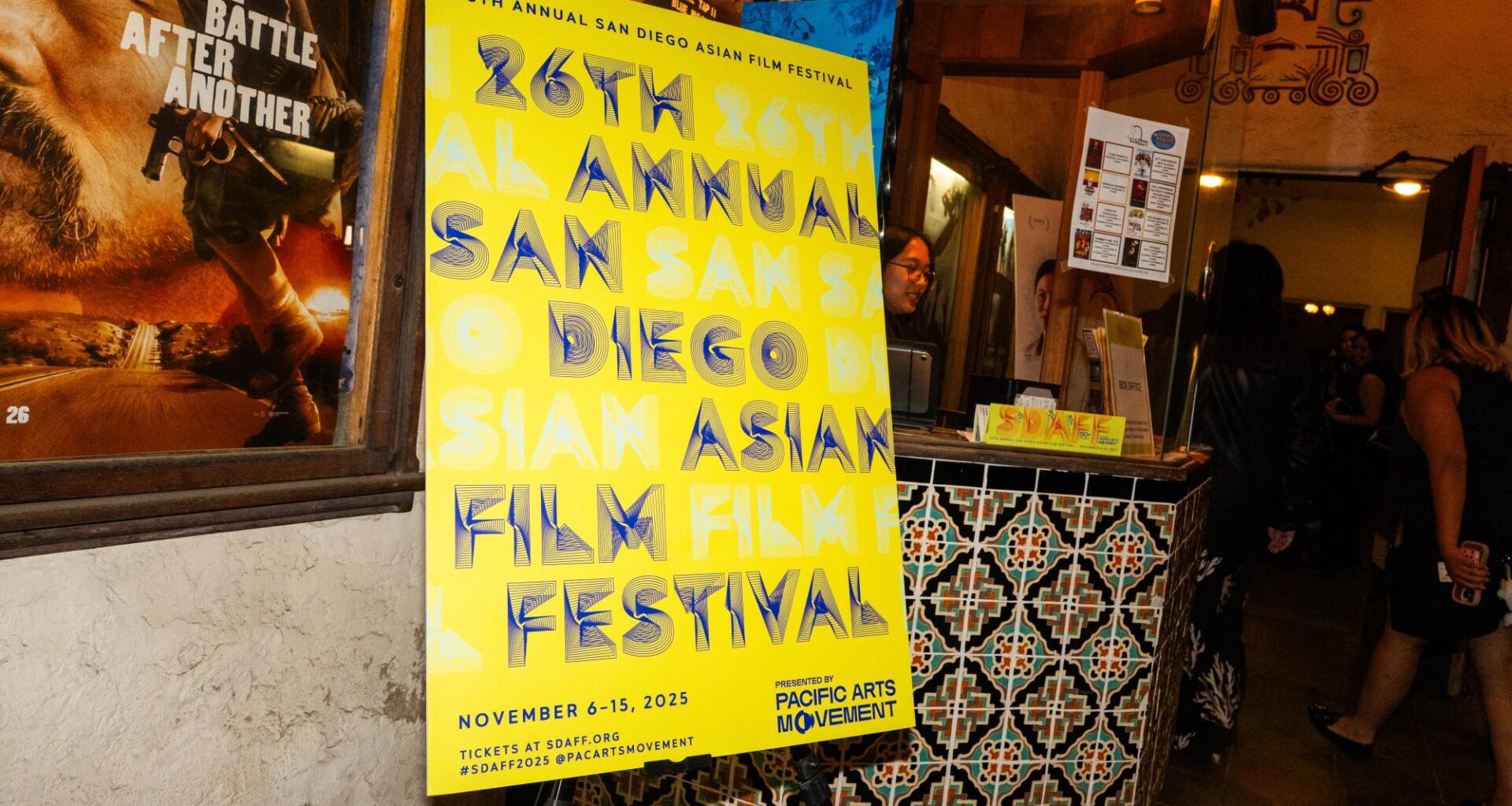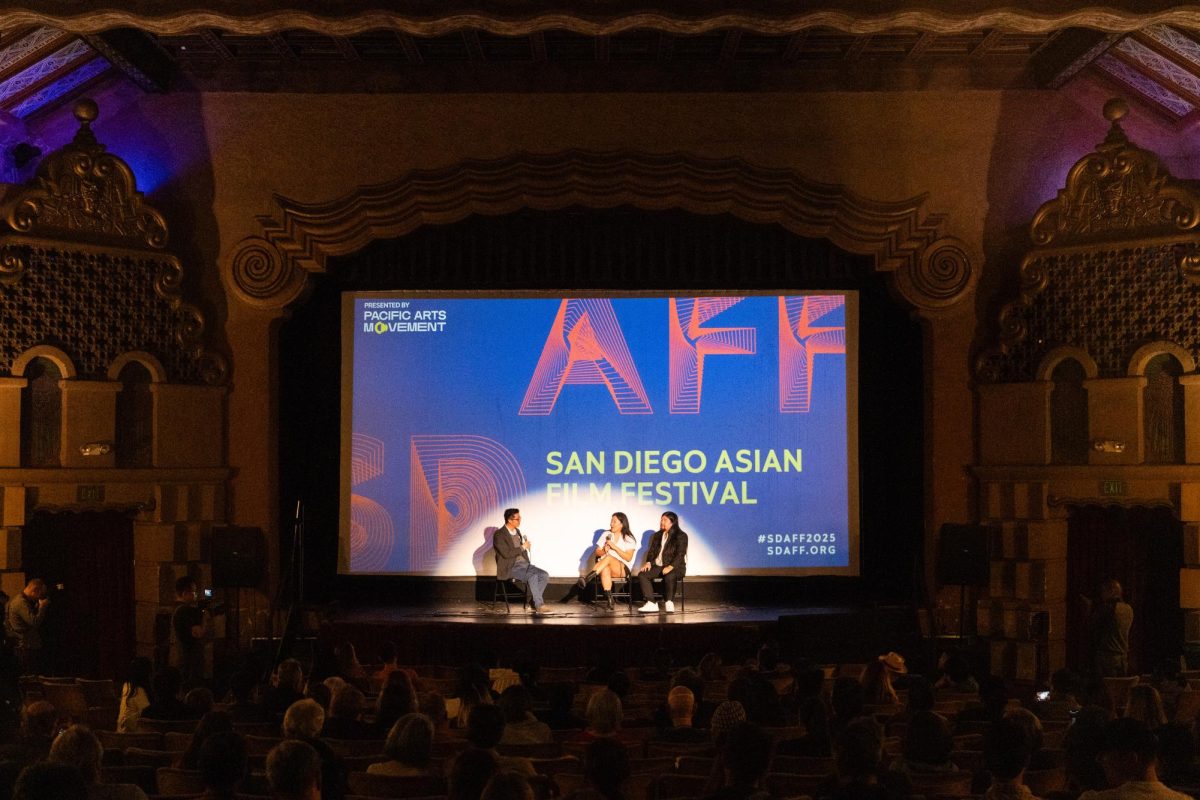‘Forge’ — “Asian families can commit crimes, too.” This was met with laughter at SDAFF’s opening night on Thursday, Nov. 6. Jing Ai Ng’s debut film “Forge,” starring Andie Ju, Kelly Marie Tran, and Brandon Soo Hoo, ushered in the festival’s premiere, creating a salient exigence for the stories to come.
Drawing inspiration from crime thrillers of the ‘90s and early 2000s, “Forge” reels audiences into the daring and dangerous world of art forgery. The film follows siblings Coco (played by Ju) and Raymond (played by Soo Hoo) Zhang as they reinvigorate a billionaire’s tattered art collection through a less-than-conventional means of restoration.
“Forge” provokes viewers with an intriguing argument: If you were to live and breathe an artist’s life through meticulous research of their work, is your study the ultimate tribute? Or is it wholly counterfeit, besmirching the name of bygone painters who are unable to speak for themselves?
Despite a potentially divisive conclusion, Ng’s direction feels intentional. Beautiful painting montages of the forgery and glamorous night shots of Miami backed by electronic, magnetic beats captivate any watcher, reeling you in right as the film opens. Her artistry in portraying art forgery shows the siblings’ aptitude and talent in their crimes.
It is clear that now, more than ever, the Asian American community must find ways to stick together amid the government’s forged realities of modern American greatness. The country now has its work cut out to build a present that looks toward an inclusive future, not a regressive past.
– Winter Moritz (Staff Writer), Nicole Hunyh (Contributing Writer)
‘Family Matters’ — I entered this Taiwanese melodrama with no idea what to expect and was pleasantly surprised by a graceful portrait of family struggles. Writer and director Ke-Yin Pan sheds light on the internal struggles of an ordinary family, which are as dramatic as any outward conflict.
Shifting between the perspectives of four family members, “Family Matters” flings away the veil covering their nuclear lives, exploring the parent-child relationship and exposing long-held secrets.
Every actor in this film was nominated for a Golden Horse Award — the Taiwanese equivalent of the Oscars — and I wholeheartedly second these nominations. Each allotted 25 minutes for their perspective, these character vignettes let the audience experience their individual stories, separate from one another. Mundane scenes — characters getting their first jobs, attending college, enjoying rosy summer nights — evoked a sense of nostalgia that anyone could relate to.
But there’s a balance between clashing moments and blissful periods, which is exactly what builds the foundation of a family. Flipping from nostalgia to panic, I found myself on the edge of my seat as the film uncovered the layers of secrets beneath the family’s facade. The unceasing turbulence in the outwardly composed family reveals what lies behind the household’s appearance: Not everything is as it seems.
-Avery Heid, Contributing Writer
‘Haunted Mountains: The Yellow Taboo’ — Taiwanese director Chia-Ying Tsai’s film debut explores the reality of grief through a supernatural lens, set in a chilling time loop. Inspired by a Taiwanese urban legend, the story is told from the point of view of Jia-Ming (Jasper Liu), five years after his friend An-Wei (Yu-Ning Tsao) disappeared in the mountains. While grappling with survivor’s guilt and attempting to navigate his relationship with his girlfriend Yu-Hsin (Angela Yuen), Jia-Ming suddenly finds himself stuck reliving that same terrifying day.
The opening scene plunges you into the mountains’ unsettling atmosphere. Paired with an eerie score, every jumpscare kept me constantly on edge. Haunting the narrative both literally and figuratively, the ghost of An-Wei torments the main characters and influences the choices they make as his memory lingers over them.
Despite strong showings from the cast, the finale fell short of giving Jia-Ming and Yu-Hsin the closure they were seeking. Still, their unsteady relationship masterfully encapsulates the universal experience of learning to let go and move forward in the wake of loss.
-Baran Bashar, Contributing Writer
‘The Waves Will Carry Us’ — “When do we choose to leave? When do we choose to stay?” These questions sit at the heart of “The Waves Will Carry Us,” a semi-autobiographical film that explores the lives of three siblings as they navigate grief, family expectations, and their ancestral legacy. When Muslim religious authorities confront them regarding their father’s burial, the siblings discover that he had converted to Islam shortly before his death.
The film shows us firsthand how grief forces people to deal with conflicts they had avoided for years. Switching between the present and moments from decades of family history, the story is told through a mix of flashbacks and a nonlinear structure that embodies the dragging of old wounds to the surface. Director Kek Huat Lau did a profound job of allowing the audience to experience this onslaught of action alongside the Lau siblings.
What stood out to me the most wasn’t just the frequent movement between flashbacks and the present, but how deeply the film made me think about the emotional weight families can carry and pass on to future generations. I felt pulled into the messiness of the Lau family and forced to witness the siblings inherit trauma, expectations, and hope, all at once.
Seeing what previous generations endured for the chance of a better life made me reflect on my own family and feel an immense sense of gratitude for the sacrifices that shaped the life I have now.
-Kaitlyn Lots, Staff Writer
‘Brand New Landscape’ — I didn’t expect “Brand New Landscape” to leave me feeling lighter, but director Yuiga Danzuka’s film wraps you in a stillness that feels like letting go of a long-held heaviness. Rather than relying on plot, its power lies in inviting us to sit with the quiet discomforts of loss and grief, and then take on the fragile work of acceptance. Danzuka’s notion of family isn’t fixed or idealized — tenderness coexists alongside the hurt and persistent ache of words left unsaid.
When the main protagonist Ren (Kodai Kurosaki) delivers flowers to his father’s (Kenichi Endo) new office, a decade of distance splits open. Yet, what moved me the most wasn’t this narrative shift, but the emotional terrain Danzuka traces afterward. As Ren and his sister (Mai Kiryu) are pulled back into their father’s orbit, the film lingers on the awkwardness of reunion, the heaviness of unspoken history, and the way old wounds quietly imprint themselves on adulthood.
Danzuka handles these moments with such restraint that even a dinner scene becomes a slow, aching unraveling. What stays with you isn’t a story of second chances — it’s the siblings’ slow reclamation of themselves as they confront a cycle of hurt they never asked to inherit and the quiet permission the film extends to let go of what no longer serves you.
-London Barton, Contributing Writer
‘Ky Nam Inn’ — In a crowded apartment complex rife with gossiping neighbors, Khang (Lien Binh Phat), a translator, is tasked with creating a new edition of the classic tale, “The Little Prince.” As he works, he slowly falls for Ky Nam (Do Thi Hai Yen), the older widow who lives in the unit below him, defying every societal norm in post-war Vietnam.
Vibrant with lush visuals and accompanied with a stunning, woodwind-heavy soundtrack, director Leon Le’s sophomore film “Ky Nam Inn” dares viewers to not fall in love with the titular apartment unit and its owner. Le frames his film around Khang’s struggle to capture a perfect translation for the bond between characters in “The Little Prince,” masterfully mirroring the precarious will-they-won’t-they dynamic between the two leads.
A treat for all the senses, “Ky Nam Inn” leaves viewers with one promise: Despite the ephemeral nature of connections, a life lived through the lens of the heart, rather than the eyes, is a life well spent.
-Nicole Huynh, Contributing Writer
‘Decathlon: The CK Yang and Rafer Johnson Story’ — Two trailblazing decathletes, one of Taiwanese excellence and the other of Black American excellence, synchronized their strides during the 1960 Rome Olympics. They left the stadium as a self-proclaimed “two-man United Nations,” a tribute to the transcending strength of human athleticism and friendship.
Frank Chen directs a celebratory documentary that captures the inspiring bond between Chuan-Kwang “C.K.” Yang and Rafer Johnson, both historically famed athletes in their respective nations. Heartfelt testimonies from friends and loved ones soundtrack real-life footage, pictures, and illustrations that showcase a human connection built across boundaries of land, time, and identity. One of the most famous photos in sports history depicts Johnson leaning on Yang’s shoulder after winning gold and silver, respectively, in the 1960 Olympic decathlon. Chen’s documentary highlights their affectionate rivalry during the 1960 Rome Olympics as the epitome of what they meant to one another.
But in Taiwan, Yang’s statues collect dust in the back of museums while his decorated home turns decrepit with only ghostly memories perforating the air. In honoring Yang, the film touches on the tragedy of a forgotten hero. All of the journalists and filmmakers involved convey a message to the audience, one which pierces the soul with colosseum-worthy sound: Continue telling the story of Taiwan’s beloved C.K. Yang, the “Iron Man of Asia.”
-Winter Moritz, Staff Writer


